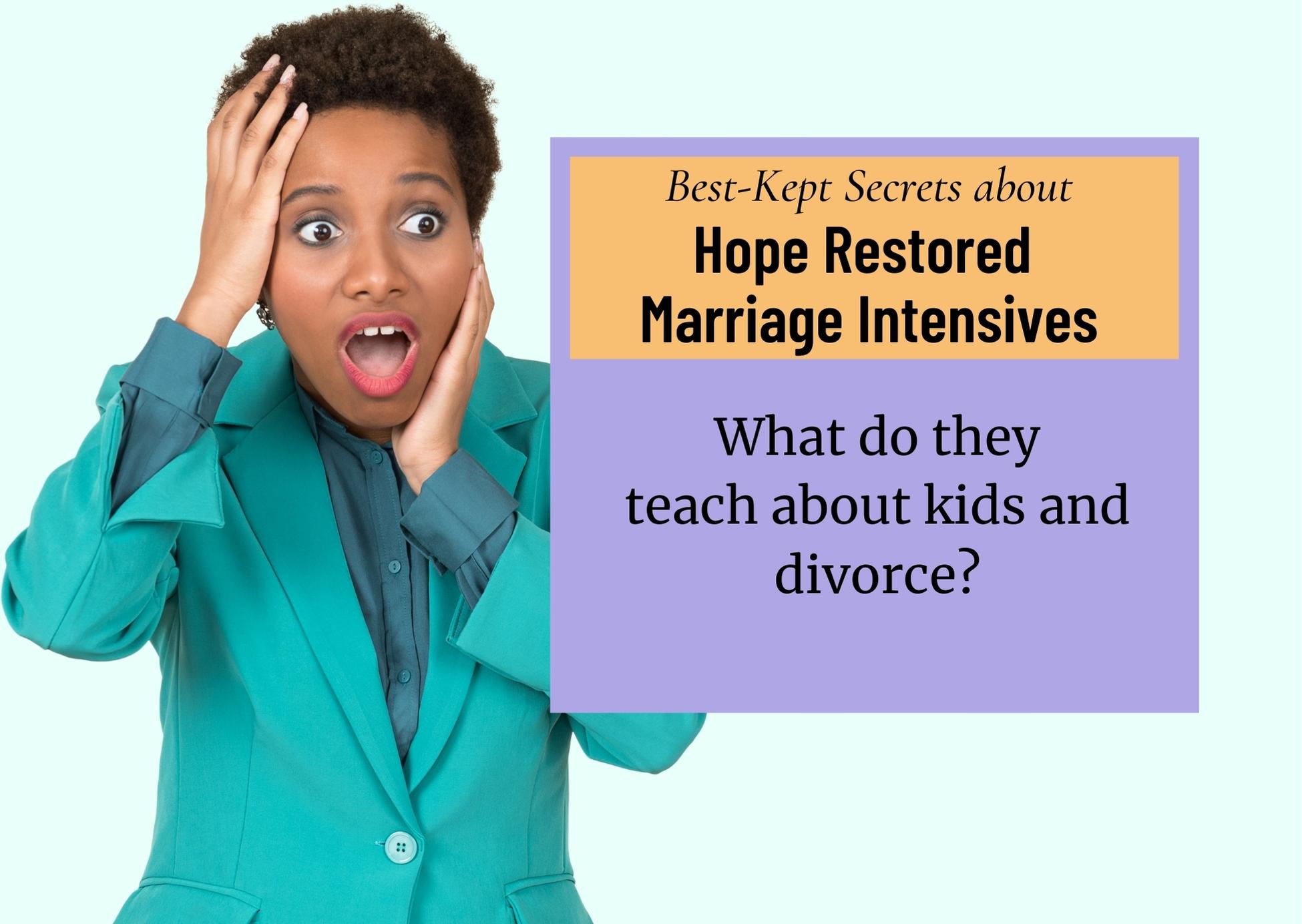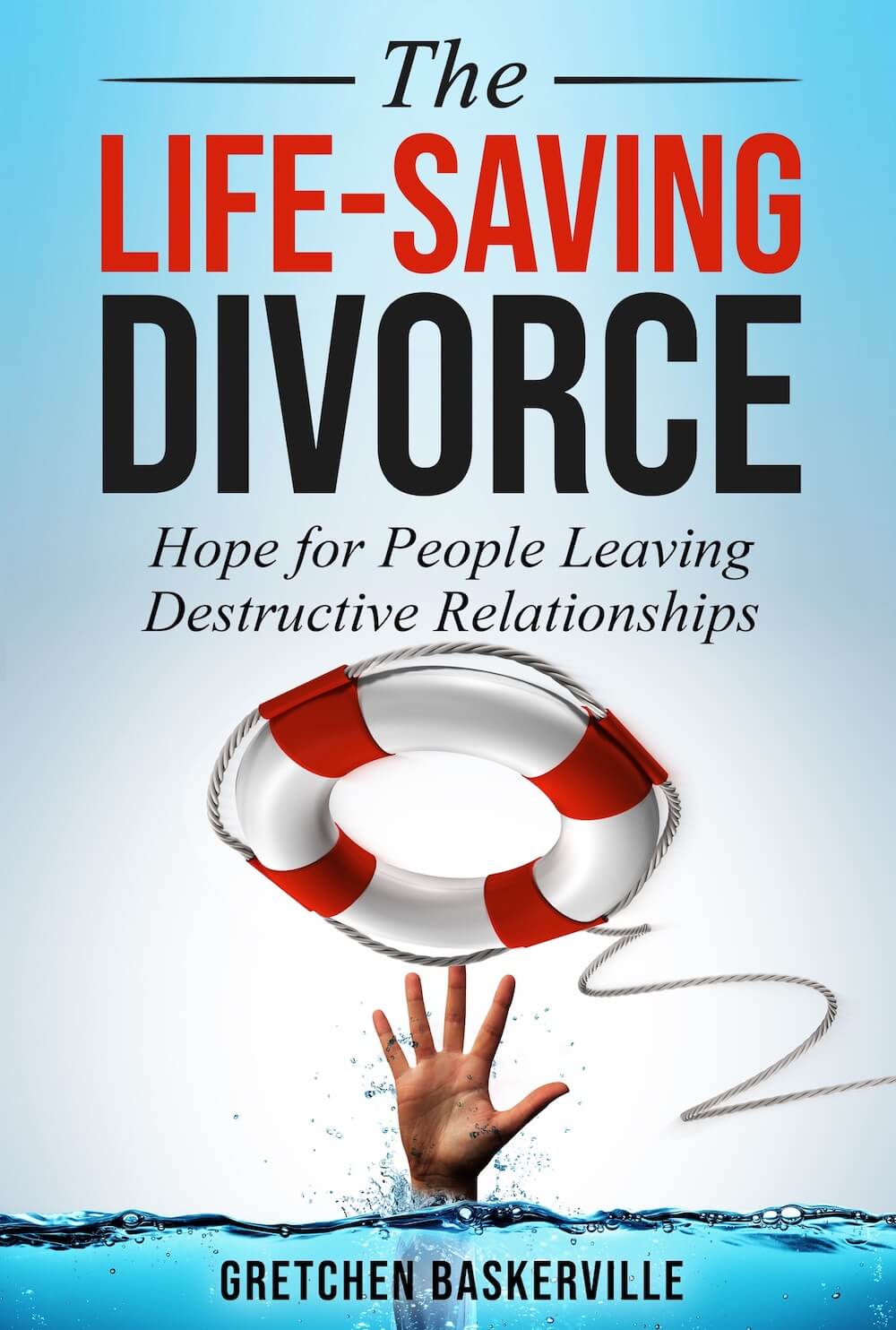Hope Restored Marriage Intensives Want to Scare You About Divorce and Children
I’m doing a multi-part series HOPE RESTORED marriage intensives from #FocusOnTheFamily. Are their results really “miraculous” as their president, Jim Daly, claims?
No, they are not, at least not for seriously troubled marriages. Not according to surveys I’ve done. (See some of their stories at the bottom of THIS article.) More than 200 people in my private Facebook group for separated and divorced Christians say they’ve attended one or more multi-day marriage intensives, and it didn’t fix the marriage or make their spouse a better person….at least not for long.
Can Hope Restored turn around a destructive marriage that has a pattern of violence, emotional manipulation, coercion, or cheating?
“No,” say many participants who’ve attended. They wanted it to work. They wanted a miracle. But it didn’t happen. The abuse continued, and in many cases got worse.
One of those participants sent me her #HopeRestored manual (copyright 2013), the one that she was given when she arrived at the $4,000-$6,000 retreat. I’ll walk you through it and share insights from former participants. This woman wanted me to use her story and this manual so other women might avoid getting pressured by Hope Restored staff to stay in a destructive marriage.
Hope Restored’s Teaching on Kids and Divorce
The first 4 pages of the Hope Restored Marriage Intensive manual (copyright 2013) appear to be designed to gaslight and scare the invested parent to stay married. (What’s an invested parent? That’s a parent who has sacrificed their life and wellbeing to hold the marriage together.)
They do this by telling wives (and it’s usually the wife):
- -Divorce will destroy their kids and
- -It’s their responsibility to fix the marriage even if they aren’t the abuser, cheater, or egotist.
That is their stated goal: To keep you married.
Let the Mind-Games Begin! They Tell You that “To Stay for the Kids” is Wrong; and Not “To Stay for the Kids” is Wrong!
The introduction to the manual starts with an explanation of the history of Hope Restored, plus a dig at miserable parents who “stay for the kids” or choose to divorce. Ugh. So right up front, Hope Restored teaches you have no choice: You can’t divorce, and you cannot remain in a state of misery just because you’ve been told it’s best for the kids. It’s your job to convince yourself there’s hope for a miracle no matter how serious the abuse or infidelity.
Here’s the quote from the manual ©2013 (emphasis mine):
Hope Restored puts the invested parent in a no-win situation. The Focus on the Family website has many articles about the importance of “staying for the kids,” but now they criticize parents who stay for the kids, and say it’s bad for kids. Here’s the first of many mind-games that Focus on the Family plays.
They are telling you upfront: You are trapped in a horrible situation unless by some miracle your spouse changes. (This is why many abusers/cheaters agree to attend Christian marriage intensives. They assume the Hope Restored’s staff will push for reconciliation regardless of how bad the abuse is because that is the view of Focus on the Family. The spouse who chooses to abuse and betray gets praised and supported for being “honest” about their problems.)
Now let’s look at the next sentence, which describes divorcees as conflict-avoidant quitters who leave merely because they are “unhappy.”
You are trapped. There, they said it. Neither choice is good. You must stay in your conflict-ridden marriage and try to be okay with this. (See? Manipulation at its finest. And they have absolutely no shame about it. And they don’t define “unhappy” marriage. Most people married to abusers, cheaters, and pedophiles would say they are unhappy.)
They start with a three-page letter they claim shows the horrible effect of divorce on children.
But it doesn’t.
It shows the horrible effect of a tyrannical parent on children.
The next three pages of the Hope Restored Marriage Intensive manual ©2013 claim to show the “The Product of Divorce.” They post a letter from a 21-year-old reflecting on her parents’ divorce and the anxiety it gave her. BUT if you read her story closely, she describes her mother and stepfather as wonderful. It’s her father who is the anxiety-inducing person in her life. She is too diplomatic to say it, but we can read between the lines: he is an egotistical tyrant who wants his own way, hates contributing financially to her wellbeing, and makes her life miserable.
The backstory of the letter. The young woman’s mother and stepfather were attending a Hope Restored marriage intensive. And we are told the 21-year-old wrote this letter in response to her mother’s request (during the intensive!) to describe “what it’s like to be a child of divorced parents.”
We learn that the daughter is a college graduate and financially independent. She is already engaged to be married and thinking about her own wedding. But she dropped everything for her mother, whom she calls her best friend, and in one hour whipped up a 3-page single-spaced email. What a great daughter! Any mother would be proud. (This contradicts what Focus on the Family suggests about kids of divorce: that they are damaged for life. Focus is wrong about children of divorce. 8 in 10 turn out fine with no long-term psychological, emotional, or social problems.)
She describes those unhappy early years. We learn that she suffered a lot of stress and anxiety and physical ailments as a child. I have a lot of empathy for that little girl.
Here’s a summary of her story (actual quotes below):
-The daughter never says she was against her mother’s divorce.
-She never says she wishes they had stayed together.
-She calls her mother her best friend.
-She describes her dad’s selfish behavior.
-He is the source of conflict and anxiety in her life.
-She says she loves her stepfather, the man her mother married, and calls him her father.
-She describes the loving relationship she has in that home with her stepsisters and brothers.
-She never says she loves her biological dad or his partner.
-She expresses no warmth at all toward her bio dad, just her fear of making him mad or disappointed.
-Her dad got agitated when her mom requested his help to get her a car and insurance (even though she’s 16 and the amount he pays for child support has likely reduced significantly).
-Her dad tells her what to do as an adult, and doesn’t care about her wishes and desires.
-She talks about the obligation of making both parents happy, but it sounds like the only one parent is demanding and selfish: Her biological dad.
-She’s “dreading” a serious conflict because she wants to ask her stepfather to walk her down the aisle, not her dad, when she gets married.
So, this little girl had parents who were stressing her out. And at least one of her parents was hard to please and put a lot of pressure on her. What kind of parent pressures a cute smart little Kindergartner? The daughter is choosing her words very carefully and is trying to avoid saying who the critical parent was, but we find out later in her story. She doesn’t say it, but in her description of his behavior, we see her father is a jerk.
So her mom is the nurturing parent who talks with her about sensitive questions. She has to wait to go home because her dad isn’t able to discuss things well.
We can see what’s going on. The daughter is bending over backward to conceal her father’s negative, maybe immoral, behavior. I imagine he’s drinking and sleeping around. Why does she feel she must model herself after both parents? She hasn’t told us one positive thing about her dad!
Who taught her to keep secrets and cover up the truth at the expense of her own emotional health? Maybe Focus on the Family did, for example, in one of their videos they praise kids for covering up and not criticizing their marriage-destroying parent! (Guess what? They do that to spouses at Hope Restored too!)
Note how much the little girl loves her mother, stepfather, and siblings. She considers her stepdad to be her father. That says a lot about the two men in her life.
She loves her stepdad and her step-siblings. They are the best ever. She is not close to her father and his new partner. She feels she must appease them. It sounds like they make a lot of demands and criticize her. She’d rather not spend much-or any-time with them as we see below.
What the heck is going on in this family? Why the chaos, anxiety, and scheduling decisions? We find out she doesn’t want to spend an entire weekend with her dad, but she must. So he’s the source of her anxiety and pressure.
She’s got friends and activities, maybe she’s in school plays or sports or band or cheerleading, but dad wants her to be with him every other weekend. Do only his wants and needs matter? Is he angry that he must pay child support and is being asked to help financially with new things, like car insurance? Is this his way of getting back at his wife for leaving him 14 years earlier?
Apparently, her dad doesn’t care enough to find a way for her to be with him AND have weekend time to do what teenagers want to do! It’s his way or the highway. The conflict is left for her to solve. Her wants and desires and friendships and hobbies don’t seem to count with him. No wonder she’s stressed out and anxious. After weighing her options, she decides to sacrifice her life for an inflexible parent who doesn’t want to pay another dime for her.
No wonder she loves her stepdad and considers him her father. I’ll bet she can hardly wait until age 18 when she’s free to make her own decisions. We find out she is!
This is not a normal divorce. This was a high-conflict divorce possibly due to a drunk cheating biological father, at least that’s what she hints at. His post-divorce abuse and control come out loud and clear in the daughter’s narrative. He’s a self-centered guy.
Look how happy she is to get out from under his thumb! And look at her terror at facing the wedding, nearly 20 years after the divorce. Her dad has serious control and abuse problems. (And maybe his new partner does too. Sounds like one of them is insisting on being in the labor-and-delivery room, even though the daughter doesn’t want it.)
To recap:
-The daughter NEVER says she was against her mother’s divorce.
-She never says she wishes they had stayed together.
-She calls her mother her best friend.
-She describes her dad’s selfish behavior.
-He is the source of conflict and anxiety in her life.
-She says she loves her stepfather, the man her mother married, and calls him her father.
-She describes the loving relationship she has in that home with her stepsisters and brothers.
-She never says she loves her biological dad.
-She expresses no warmth at all toward her bio dad, just fear of making him mad or disappointed.
-He make a fuss about helping her financially when she needed a car.
-Her dad tells her what to do as an adult.
-She talks about the obligation of making both parents happy, but it sounds like the only one parent is demanding and selfish: Her biological dad.
-She’s “dreading” a serious conflict because she wants to ask her stepfather to walk her down the aisle, not her dad, when she gets married.
MY PREDICTION ABOUT THE DAUGHTER
To be honest, this adult daughter has gone through a lot of pain, anxiety, fear, control, and confusion. I hope she has good friends, a good husband, and a good therapist.
I predict that 10 years from now, that daughter and her new husband will find peace from the fear, guilt, threats, and obligation her dad used to trap her for so long. I predict she will finally have the freedom to shut this selfish man out of her life and put some distance in their relationship.
It sounds like she’s grateful her mom got a life-saving divorce that opened the way for her to live in a peaceful loving stepfamily for at least half her childhood.
THE REST OF THE LETTER
The daughter gave permission to have her email published. I wonder if she knew her letter would be used by Hope Restored to scare women like her dear mother to stay with abusers like her dad. I’ll bet that would upset her. And perhaps she rescinded her permission because her letter doesn’t appear in the 2021 version of the manual.
I also wonder if the daughter really wrote the last paragraph. I think her stepfather did, as she mentioned above. The tone, viewpoint, and style are so different from the rest of the letter. It’s written from a parent’s point of view, not the child’s. And it expresses how a parent worries about and misses a child when they are at the other parent’s home. There is also grief that the parent cannot control what happens in the other parent’s home. Believe me. I understand this. My heart goes out to those wonderful stepparents who are loving and caring.
#HopeRestoredMarriageIntensive‘s goal failed. They wanted to scare parents into staying together. Instead, this letter shows a daughter who lets us know the truth: some people are too dangerous to have in your life, and you might need to divorce them to get yourself and your children to safety. It also shows that having two homes helps the child see the truth. Which home is more loving, honest, sacrificial, and nurturing? This daughter knows what kind of home she wants. Her mom’s, not her dad’s.
WHAT’S THE TRUTH ABOUT KIDS AND DIVORCE?
-8 in 10 kids of divorce turn out fine, with no lifelong emotional, psychological, or social problems.
-The majority of kids of divorce who marry have lifelong marriages themselves.
-Experiencing or observing physical, psychological, sexual abuse, or living around substance abuse, abuse of a parent, or criminal behavior increases a child’s risk of serious health problems in adulthood.
-If the marriage is bad, divorce is good for kids. If the marriage is good, divorce is bad for kids.
-A fit loving single-parent home is better than a toxic two-parent home.
-Children whose parents divorced for serious reasons are likely to still have a high view of the institution of marriage.
[i] The concept of the “invested” spouse is from Bob Hamp, MFT. This is better than “innocent” spouse, because some people don’t view themselves as innocent. They have tender consciences and recriminate themselves for every thought, word, or deed that isn’t perfectly accommodating to the other person. The invested spouse sacrifices their life and sanity to keep the other spouse from sinning.
- What is a Life-Saving Divorce? How Do We Know Half of Divorces are “Life-Saving”? (or watch the video)
- Life-Saving Divorce: Introduction What Is this Book About? (audio and transcript)
- About Me: Why Is a Nice Christian Girl Like Me Promoting Divorce?
- How Can I Get the Book, The Life-Saving Divorce? (Amazon affiliate link.) – FREE study guides for each chapter. – FREE videos for each chapter.
- Myth: Divorce is the Unpardonable Sin and “God Hates Divorce”
- Abuse is Biblical Grounds for Divorce
- Malachi 2:16 Haven’t Our English Bibles Always Said, “God hates divorce”? No.
- “But He Never Hit Me”: Divorce for Neglect, Emotional, and Financial Abuse
Physical and Emotional Abuse & Infidelity
- 130 Examples of Abuse: Emotional, Physical, Financial, Spiritual and Gaslighting
- Pastors Who Accept Physical and Emotional Abuse as Grounds for Divorce
- Severe Emotional Neglect: Toni’s Story of Finding Freedom (video)
- 40 Years of Murderous Rages and How I Got Free! Karen’s story (video)
- How Churches Should Handle Abuse Victims (video with Pastor Neil Schori)
- Help! I’m Married to a Cheater: Should I Stay or Go?
- Married to a Pedophile: How I Got Out – Pam’s Story (video)
- Help! I Am Alone with the Abuser
- Jesus’ Greatest Divorce Sermon – Luke 13 (or watch the Video)
- Pastors Who Accept Physical and Emotional Abuse as Grounds for Divorce
- Myth: The Person Who Files for Divorce Caused the Divorce
- Haven’t Our English Bibles Always Said, “God hates divorce”? No.
- Jesus Said, “Love My Enemy”-Can I Still Divorce Them?
- But I Thought it Was God’s Will for Me to Marry this Person!
- Is Pointing Out Marriage-Endangering Sin Being Judgmental? (video)
- One Woman’s Story: Adultery, Prayer and the Bible
- Is Marriage an Unconditional Covenant or a Conditional One? (Video)
- Does Divorce Shatter the Image of Christ and the Church as John Piper Suggests?
- Divorce and the Good Samaritan Story
- Myth: Divorce is the Unpardonable Sin and “God Hates Divorce”
- Myth: Your Divorce Will Shatter the Image of Christ and the Church
- Myth: You Must Forgive and Forget Over and Over, Forever
How to Find a Good Supportive Church
- Pastors Who Accept Physical and Emotional Abuse as Grounds for Divorce
- 7 Ways to Know if a Church is Safe for Abused Wives (or Abused Husbands)
- Do My Pastors Have a Say about Me Getting a Divorce?
- Good vs. Bad Pastoral Counselors on the Topic of Marital Abuse: 40 People Tell their Stories
- 5 Bible Verses that Say You Should Separate from an Abuser
- 1 Million God-honoring Divorcees Cannot Find a Good Church
- Church Denominations and Divorce Policies Comparison Chart
- Excommunication for Getting Divorced? What to Do!
- Evangelicals Shooting their Own Wounded Divorcees (video) or blog/transcript
- How to Handle Criticism When You Divorce (video-3 parts) Natalie Hoffman, Gina Kaye
- Myth: You Don’t Take God-Ordained Marriage Seriously
- Sermon Ideas for Domestic Violence Awareness Month – October
- Churches That Block Abused Wives (and Husbands) From Divorcing
- Southern Baptists make Evangelicalism Unsafe for Abused Wives & Husbands
- How Churches Should Handle Abuse Victims (video with Pastor Neil Schori)
- List of Every Known Puritan Divorce in Massachusetts between 1639 and 1692.
- Your Kids Will Likely Be Fine After Divorce (Nearly 8 in 10 Are!)
- 10 Facts Evangelical Pastors MUST Know about Kids and Divorce [VIDEO]
- There Is No Divorce Crisis. We have a Sin Crisis.
- Myth: 95% of Divorces are for Falling Out of Love
- Will I Ever Find Love Again?
- Dating after Divorce: An interview with Gina Kaye
- I Fear I’ll Never Find a Healthy Relationship
- Remarriage after Divorce: How Can I Claim to be the Innocent Spouse? I Had My Faults Too!
- Will the Kids and I Ever Be Happy Again?
- Happiness Either Way: Remarriage or Staying Single
- Divorce May Improve Your Health: Depression, Suicidal Thoughts and Medical Issues
- How My Health Improved Dramatically After Divorce: Karen’s Story (video)
- “I’m Off of All My Depression Medications Now That I’ve Divorced” Schari’s story (video)
- PTSD, EMDR and My Major Health Improvements after Divorce Toni’s story (video)
- Christians Finding Peace after Divorce: Shirley Fessel, Author (Audio) or (Video)
- 10 Turning Points: Stories of How Others Decided to Stay or to Go
- Married to a Pedophile: How My Kids and I Got Free! (video)
- Finding Joy after a 40-Year Abusive Marriage (video)
- Can I Divorce My Mentally Ill, Destructive Spouse? Yes! Amanda’s Story (video)
- From Bondage to Glorifying God! 5 Survivor Stories (after 20-, 30-, 40-year long abusive marriages)
Self-Doubt, Second-Guessing Ourselves, and Gaslighting
- Am I the One Destroying the Relationship?
- How Can I Call Myself the Innocent Spouse? I Wasn’t Perfect Either (video)
- Is Pointing Out Marriage-Endangering Sin Being Judgmental? (video)
- Myth: He Wouldn’t Cheat or Watch Porn if You Gave Him More Sex
- Myth: You’re Lying: We’d All Know If Your Spouse Was That Bad
- Myth: It Takes “Two to Tango” and “All Marriage Problems are 50/50”
- How to Handle Criticism When You Divorce (video-3 parts) Natalie Hoffman, Gina Kaye
- Is it Best to “Stay for the Kids”? Sometimes, yes. But Not if It’s a Toxic Marriage
- Researchers Know Your Kids Will Likely Be Fine After Life-Saving Divorce
- 5 Studies That Say Your Kids are Likely to Be Okay After Divorce (video)
- Marriage Does Not Guarantee Good Kids: 1 in 10 Kids from Married Two-Parent Homes are Troubled.
- Myth 21: Divorce will Destroy Your Children, So Stay for the Sake of Your Kids
- Research shows: Your Kids Will Likely Be Fine After Divorce: In Fact It’s Best to Divorce to Get Away From Abuse
- 12 Ways to Document and Protect Yourself in a High-Conflict Divorce
- 12 Tips for Talking with Angry, Alienated Kids
- Myth: Divorce will Destroy Your Children, So Stay for the Sake of Your Kids
- Myth: Your Marriage Would Be Great if You Just Submitted More
- Myth: Divorce will Destroy Your Children, So Stay for the Sake of Your Kids
- Myth: Divorce is the Unpardonable Sin and “God Hates Divorce”
- Myth: You Just Didn’t Try Hard Enough
- Myth: You Don’t Take God-Ordained Marriage Seriously
- Myth: Your Divorce Will Shatter the Image of Christ and the Church
- Myth: You Must Forgive and Forget Over and Over, Forever
- Myth: 95% of Divorces are for Falling Out of Love
- 27 Myths about Divorce That Probably Don’t Apply to Committed Christians
- Download “7 Effective Ways to End the Stigma of Divorce in the Church” (Sign up)
- Download “7 Effective Ways to Deal with Criticism when You Divorce” (Sign up)
- Download “3 Studies that Show Kids Are Most Likely to Turn Out Fine After Divorce” (Sign up at bottom of page)
- Home Follow me on Facebook • Follow me on Twitter • Buy the book.
- 10 Key Highlights from the The Life-Saving Divorcebook: 10-minute video overview OR 10 Key highlights blog post
- Request to Join the Life-Saving Divorce Private Facebook Group (Don’t forget to answer the 4 questions)
- Subscribe (FREE) to my You Tube Channel
- About Me Contact
- Gretchen’s Life-Saving Divorce Interviews in the Media



 :
:
 Buy PDF
Buy PDF